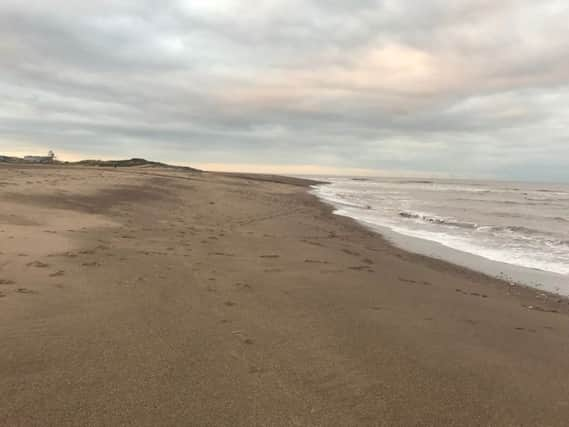£7m beach nourishment scheme launches to protect coast


Work begins on Monday to help the Environment Agency manage the coastal flood risk to around 20,000 homes and businesses, 24,500 static caravans, 35,000 hectares of land, as well as a bustling tourist industry.
Over the course of the Lincolnshire Beach Management (LBM) scheme, the EA’s contractors will pump around 400,000 cubic metres of sand onto Lincolnshire’s beaches.
Advertisement
Hide AdAdvertisement
Hide AdThis sand helps to protect people and their properties from coastal flood risk by preventing damage to the sea defences along the coast and reducing the risk of overtopping.
The added sand acts as a buffer between the sea and the defences, taking out the brunt of the wave energy, thereby extending the life span of the defences.
Restoring sand levels that are naturally lost to the sea over the year helps the EA reduce flood risk to over 20,000 homes and businesses, 24,500 static caravans and 35,000 hectares of land. The EA has carried out these works since 1994.
Over the next six weeks, beaches at Trusthorpe, Mablethorpe, Ingoldmells, Trunch Lane, Wolla Bank, Chapel Six Marshes and Huttoft will be replenished. The sand that is used to replenish the beaches is dredged from licensed offshore locations by a trailing suction hopper dredger. Twice a day – just before high tide – the dredger moves closer to the beach to pump approximately 5,000 cubic metres of sand onto the beach. The HAM316 dredger that is used for this scheme has the smallest carbon footprint in its class.
Advertisement
Hide AdAdvertisement
Hide AdMark Robinson, senior flood risk advisor for the Environment Agency, said: “Our Lincolnshire Beach Management scheme helps us protect thousands of homes and businesses on the Lincolnshire coast. The scheme also offers real value to Lincolnshire’s coastal tourism economy, by maintaining the sandy beaches that are so well-loved by residents and visitors alike.
“While our annual beach nourishment works continue to be very effective, our long-term estimates suggest that it will not be sustainable to continue with just sand as a method of flood risk management in the future due to the impact of climate change.
“This is why we have worked over a number of years to review our strategy for coastal flood risk management between Saltfleet and Gibraltar Point. We took a shortlist of options to public consultation in early 2019 and are currently finalising our new draft strategy for coastal flood risk management over the next 100 years, which we will be taking forward to consultation later this year.”
l The Environment Agency (EA) is launching a consultation on Monday 3 June on its new draft strategy to manage coastal flood risk between Saltfleet and Gibraltar Point over the next 100 years.
Advertisement
Hide AdAdvertisement
Hide AdThe draft strategy proposes a new approach, which looks to introduce rock structures onto the beach in combination with continued beach nourishment to reduce sand movement. These structures can take many forms but are likely to be rock in the shape of either groynes, fishtails or a combination of the two. The configuration and exact size of the structures will be determined through detailed analysis and technical appraisals during the delivery phase of the strategy.
This public consultation is open for a twelve-week period and the EA invites everyone to get involved and share their views. Submissions can be made online, at one of the public drop-in events the EA is organising or through a postal consultation form which can be requested by calling 02084749136.
The following public drop-in events have been scheduled. Registration for these events is not necessary; simply show up on the day.
o Chapel St Leonard’s village Hall; 2-7pm on 8 July
o St Paul’s Baptist Church in Skegness; 12-7pm on 9 July
o Meridale Centre in Sutton on Sea; 12-7pm on 11 July